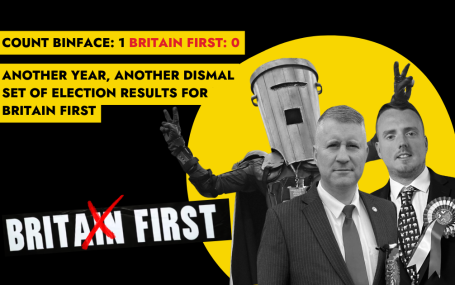HOPE not hate uses cookies to collect information and give you a more personalised experience on our site. You can find more information in our privacy policy. To agree to this, please click accept.
Not every person or organisation who is perceived to be creating disruption in a community is motivated by hate, and certainly not all community tension is instigated or inflamed by a hate group or by extremism. There’s no doubt that some of the ideas and tools we have covered on this site can be useful to calm all kinds of tensions in communities. However, there will be times when you might find yourself faced with something which does seem to be motivated by hate. This section will take a look at how we try to define ‘hate’ and ‘extremism’. – This is adapted from an article written by Nick Lowles in State of HATE 2019
One of the big dilemmas facing people and organisations challenging hate and extremism is to actually explain what hate and extremism are. And it is not as easy as it might first appear. Search the internet and you get a wide variety of options, but none of them really seem to work in practice. Some are perfectly sensible when looking at one specific type of extremism, but work less well on another type of extremism. A definition that works well for violent extremism, might not be appropriate when applied to non-violent extremism.
The Government, in its 2015 Counter Extremism Strategy document, defined extremism thus:
“Extremism is the vocal or active opposition to our fundamental values, including democracy, the rule of law, individual liberty, and respect and tolerance for different faiths and beliefs. We also regard calls for the death of members of our armed forces as extremist.”
However, most people, especially those working in local communities, do not really identify with this definition either. It begs the question of what our “fundamental values” are and who decides them. We need to be extra careful we don’t create a definition which actually simply defines what we don’t like about a particular identified enemy rather than defining ‘extremism’ or ‘hate’ as an abstract thing.
One of the key problems is that extremism can be a behaviour or a belief, or both. Hence, one can believe one is a ‘victim’ but not behave in an extreme way. Or conversely, one can believe one is the opposite of a victim (believing in a version of supremacism) but still act in an extreme way. Similarly, the behaviour might only be extreme in context. In a conflict setting for example, we would not call soldiers ‘extremists’ for committing violent acts unless they behaved in a way that was removed from the ordinary in that context. Similarly, one society might view an action as normal, while another society might view that exact same practice as extremism.
There is also the danger that an academically robust definition is sometimes hard to translate in the real world so that it can easily be understood by ordinary people. This makes the Cambridge Dictionary definition of an extremist – “someone who has beliefs that most people think are unreasonable and unacceptable” – quite appealing. But even this definition has its shortcomings, as it could mean that people who have unorthodox but perhaps harmless ideas could be labelled extremist.
Given the problems with any definition, it is understandable why some people prefer to sidestep the issue and just get on with their day-to-day work of challenging extremism. But I think this is wrong. However difficult it is, we have to come up with a clear and appropriate working definition.
Of course, extremist groups display different ideologies, tactics and motivations, but surely there must be a useful definition that can encapsulate them all and be easily understood by people in local communities. A clear definition helps us create the red lines with which we can measure whether a group or individual is extremist or not. This is particularly important when dealing with non-violent and less extreme groups. A better definition of “extremism” will help us better understand and identify religious extremism, something which HOPE not hate has not really done over the years but certainly should be addressing going forward.
For me, and this is just my personal view, there are six possible characteristics to an extremist. Some extremists might hold several of these characteristics, but not others, while others will hold some of these characteristics mildly, but others more forcefully. They include:
Having a clear definition of what extremism is, and how we measure it, will have the added benefit of allowing us to define what we actually are and stand for. As we have repeatedly discovered throughout the years at HOPE not hate, it is not just good enough to be “anti”, but it is important to articulate what we are “for”. By defining extremism, we can then define the values which we live our lives around. While accepting this has to be fluid and no-one should be forced to think or behave in a certain way, having a positive set of values around which we can organise might also be the best way to unite communities against hate. This, ultimately, may be the best reason why we need a definition of extremism.

Another year, another dismal set of election results for Britain First In the elections last week, Britain First performed dreadfully in every seat it contested,…